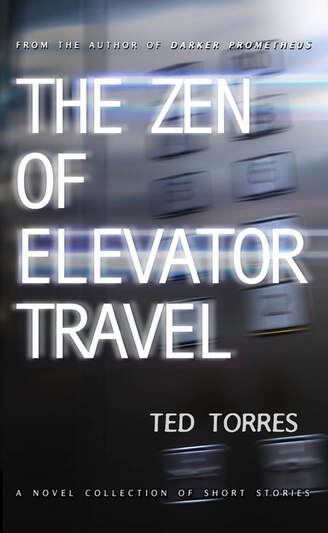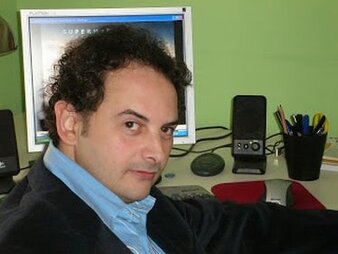 "And there it was again, the zen of elevator travel, those few moments when all that was required of her was simply to occupy the space without any thought, in the calm silence of a mind now desperate to reach its destination." That’s right, something good came out of 2020 from the Team Torres camp, as while in the midst of the worldwide pumping of the brakes that was the COVID-19 quarantine lockdown, I was able to sit down and punch out my fourth book, a short-story collection entitled, The Zen of Elevator Travel. Well, let’s back up a bit … As some of you may recall, there was once a little gathering about four years ago that myself, Dickie English and George Ortolano organized here in New Orleans called The Artist’s Entrance. Designed as a place where artists in the three main areas of music, visual arts and creative writing could congregate and be heard, the event took off and had a great run, cementing the idea that something of that nature needed to exist at the time ... at least for Dickie, George and myself! The structure of the event was simple: each month, we’d feature a visual artist, a writer and a musician, all three of which would show their work, so to speak, and then take questions from the audience regarding their process. Between featured artists, we’d reserve time for an open-mic portion designed primarily for other visiting writers and musicians to show off their stuff. As it turns out, I took this opportunity to showcase some of my writing, in particular, this new thing I was trying called short stories. During this time, I had written and read publicly two short stories, one called "Timelines" and another, which would eventually become the title story of this new collection, "The Zen of Elevator Travel." The stories raised some eyebrows – short and sweet atmospheric jabs to that part of the psyche that basks in the sensual. I understood immediately that I wanted to explore this form, and even when The Artist's Entrance concluded its run (for now), I continued on with my new passion of "manufacturing" these short stories. I'd learned during this time that short stories can be about anything, about settings and situations, about stream-of-consciousness thought and ideas, and as was the case in what would become the longest piece in the collection, "Stan the Man," a true narrative with a beginning, middle and end wedged between the other paint strokes of words and ideas. It was exhilarating, especially when I began to connect the stories much like skits from a Monty Python episode, with characters walking in and out of one story into the next. However, a further intended artistic decision was to make all of these stories mutually exclusive, meaning that they are able to be read in any order, or in the case of the framework of the book, on any "floor" that the reader should happen to visit. It had truly become my "novel" (new) collection of short stories. I worked on these stories on and off for the next few years, especially during the height of the pandemic, culminating in a collection that evolved into something that I hadn't anticipated, and which would result in my fourth completed book. I'm extremely proud of this piece, a departure from my larger novels, but a format that I can guarantee I'll visit again. I've fallen in love with the format of the short story, and I hope that this piece inspires writers to create their own literary "paint strokes." This book is dedicated to the manufactures of short stories everywhere, and to you, I hope that I've done you proud. And to you, the faithful readers, thank you for your continued support and accompaniment as I continue on with this, my writer's journey.  Many a blog has been written about where and when writers are at their most productive, with some even adhering to strict rules regarding their writing spaces and the times during which they can even begin to consider producing pages. Most would like to say that they can do it anywhere, because it goes hand-in-hand with the age-old adage that writers just write, and for some of us, that's what we have to do in order simply to stay content. Therefore, it should hold true that for writers to write, they should be able to do it anywhere the muse should happen to strike them. Unfortunately, this isn't always the case, especially for writers who need a certain ambiance in order to do what they do, like environments that allow for background music, or for some the lack of any background noise at all. I have an office at home where I work, and in fact I've always had a designated place to write for as long as I can remember. But when I got my first laptop, back when iPads and such weren't as commonplace as they are now and desktops were the only starting points, I considered myself free to compose wherever and whenever. I looked forward to this freedom all my life, fixated on the newest gizmos that would allow me to take the writing desk with me wherever I went. Time was never that important. When I was doing it full time, I treated it like any full-time job. I wrote and edited all day long, and the time of day became irrelevant, influenced only by when I'd run out of gas. Now, however, the time to write has become a commodity, and I was forced to find that perfect time in my schedule where I could do what it is that I need to do to sustain me. So enter the bedroom, on any weekend morning, and you'll find me there. I have found that during the waking hours, in bed, is where it works for me now. Sure, I still use my office, but that's for editing now. Saturday and Sunday mornings (regardless of a gig the night before) see me up and stumbling to the kitchen to make a pot of coffee. Then on the way back to bed, I grab the laptop. Then the still-sleeping mind slowly unravels itself onto the keyboard. Sometimes the thrill is not remembering what I'd done in those waking hours, because as it goes I'm strong for about three hours, and then I have to stop for fear of losing quality. I put the laptop back in my office, and the rest of the day is me walking in and out, sitting in front of the laptop for a tweak here and there before wandering off again. This works for me now, especially with this new manuscript, in which I've just hit ten chapters and over 100 pages. Where is your sweet spot?  The following is a passage from the novel The Map of Time by Felix J. Palma (pictured): Not even the touch on the skin of the delicious breeze heralding the arrival of summer, nor caressing a woman's body, nor sipping Scotch whiskey in the bathtub until the water goes cold, in short, no other pleasure Wells could think of gave him a greater sense of well-being than when he added the final full stop to a novel. This culminating act always filled him with a sense of giddy satisfaction born of the certainty that nothing he could achieve in life could fulfill him more than writing a novel, no matter how tedious, difficult, and thankless he found the task, for Wells was one of those writers who detest writing but love "having written." There is so much truth to these sentences that it's as if I've found a sibling in this grouping of words, a truth that is so unlike a truth but rather a matter of fact, never having to prove itself as being otherwise. Like I felt about Woody Allen in his movie "Midnight in Paris," writers just get other writers and cater to them as such. Last night, I read my last completed chapter so far, and it left me stunned and so satisfied that I slept better than I'd slept in a long time. |
Categories
All
Archives
February 2021
|